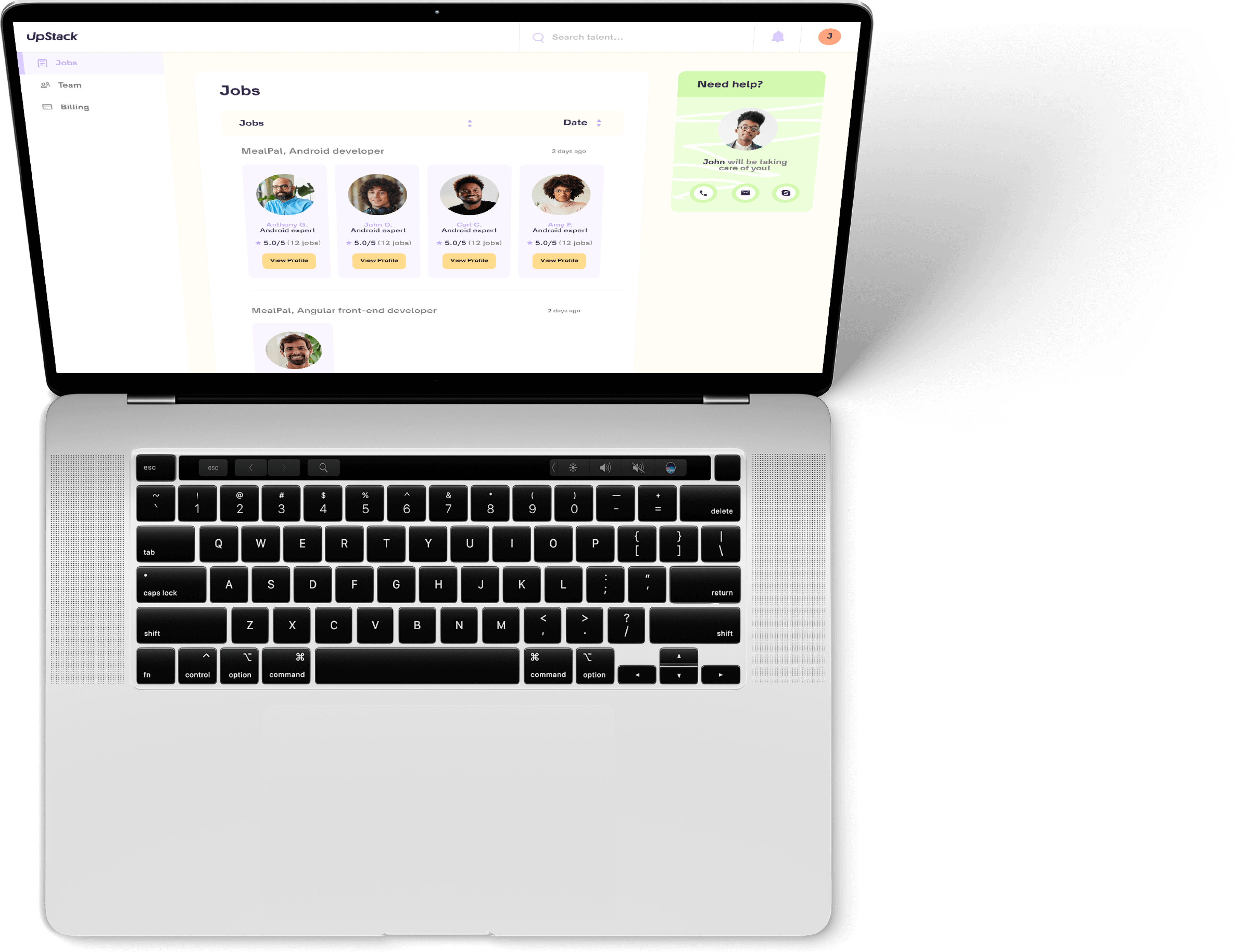


Hire Kotlin Developers Remotely {Devs Ready!}
Stella B.
Available
Kotlin Developer
-
Experienced Kotlin engineer with seamless project implementation
-
Loves guacamole & hates spoilers

-
Marcus T.
Available
Kotlin Engineer
-
Stacked portfolio of beautiful, functional websites
-
Known for his epic charcuterie & cheese boards

-
David M.
Available
Mobile Developer
-
Mobile engineering guru with a knack for translating stakeholder needs
-
Would rather be diving Palau’s Blue Corner

-
Top UpStack Kotlin Developers
Hire Kotlin Developers with Upstack
If you're looking to add a Kotlin developer to your team, you need to do your research. Kotlin is an open-source, cross-platform language developed by JetBrains that is used for Android, Java, and web development. With its modern syntax and strong support for functional programming, it has become a popular choice for developers. When hiring a Kotlin programmer, there are a few key elements you should consider, such as their experience, qualifications, and expertise. You want to ensure you hire the right person for the job, so it's important to do your due diligence when it comes to researching potential candidates. The following can help you understand what you should look for in a Kotlin developer and how to find the right one for your team.
What is Kotlin and why is it popular?
Kotlin is an open-source, statically typed programming language that runs on the Java Virtual Machine and can be used to create applications for Android, web, and server-side applications. With its simple syntax, strong interoperability with Java, and support for functional programming, Kotlin has become a popular choice for modern application development.
Due to its interoperability with Java, one of the most popular programming languages, and its ability to be used across all major platforms, Kotlin has become a popular choice for programmers. While it is not yet as widely used as Java, its popularity is increasing, with many developers preferring its modern syntax and stronger support for functional programming.
Kotlin's increased popularity is largely due to Google's announcement that it will fully support the language on Android, making it the first official language that is not a derivative of Java. This announcement has made Kotlin an attractive choice for devs who are looking to create Android apps.
Qualifications and experience to look for in a Kotlin developer
While a candidate's skills and experience are definitely important to consider when hiring a Kotlin developer, it's also important to look at the candidate's qualifications and whether they're a good cultural fit for your team.
Since Kotlin is still a new language, it's important to find a candidate who has experience with the language. Ideally, you should look for candidates who have at least three years of experience with the language and who have completed larger projects that put their skills to use.
You should also look for candidates who are interested in staying up-to-date with the latest technologies and industry trends. A good way to find out if a candidate is truly interested in staying on top of the latest trends is to see if they're active on social media and what sites they frequent.
You also want to make sure the candidate has the right qualifications and skills for the position. You may have a specific job description, but you also want to make sure the candidate is a good fit for the company. You can do this by asking the candidate questions that let you get to know them better, such as what they like to do in their free time, what type of work they enjoy, and what their long-term goals are.
How to find the right Kotlin programmer
Finding the right Kotlin developer starts with making sure your job posting is attractive to the right candidates. When writing your job listing, make sure you're completely transparent about the job requirements, as well as the terms of the position. You want to attract the right candidates and weed out any unqualified applicants, so it's important to be specific. When writing your job posting, consider including the following:
- Job description: Include a detailed job description that outlines the responsibilities of the position and the qualifications that are required.
- Company culture: Let candidates know what the company culture is like and what they can expect when working for your team.
- Compensation and benefits: Be transparent about the compensation and benefits that are offered for the position.
- Location and other requirements: Let candidates know where the job is located, the hours required, and any other requirements that are needed for the position.
Evaluating potential candidates
After reviewing resumes and conducting phone interviews with candidates, it's time to conduct interviews. For interviews, you want to make sure you have a list of questions prepared to gauge each candidate's experience and see if they are a good fit for the position. You should also provide candidates with a challenge or problem that they can work through during the interview, such as a sample project or a programming question.
It's important to look for candidates who are engaged and who ask questions. You want to make sure your candidates are engaged and interested in the job, so encourage them to ask questions and show that they are engaged in the interview. You can also use the interview as an opportunity to see if the candidates' skill sets match what you are looking for in an employee.
Tips for successful interviewing
Before the interview, make sure you are prepared for what is to come. Here are a few tips for successful interviewing:
- Prepare questions: Make sure you have a list of questions prepared for each candidate that pertain to their experience and qualifications for the position.
- Create an interview schedule: Make sure you have enough time to interview each candidate and that you conduct each interview at the same time each day.
- Take notes: Make sure you take notes throughout the interview, especially if you are interviewing multiple candidates. This will help you remember the details of each interview and provide you with helpful information when it comes time to make a decision.
Advantages of hiring a remote Kotlin developer
Hiring a remote Kotlin programmer has many advantages for both your company and for the candidate. Some of the benefits of hiring a remote developer include:
- Reduced costs: Hiring a remote Kotlin developer will likely save you money, as you don't need to provide a physical work space.
- Access to a wider candidate pool: Remote workers are often more willing to relocate as they don't have to worry about uprooting their families.
- More opportunity to diversify your team: Hiring a remote worker who has different cultural and social backgrounds can diversify your team.
- More opportunity to build a strong relationship: Hiring a remote worker creates an opportunity to build a strong relationship and rapport with your team members.
- Adding expertise and skills to your team: You can hire a remote developer with skills that are hard to find and you can add these specific skills to your team.
Benefits of using UpStack to hire a Kotlin developer
Hiring a remote Kotlin programmer through UpStack can be a great option for companies of all sizes. Some of the benefits of hiring a remote Kotlin developer through UpStack include:
- Access to a large talent pool: A staffing agency likely us has a larger talent pool to select from, so you can find the best Kotlin developer for your company.
- More opportunity to diversify your team: Upstack can help you hire a remote developer who has diverse skills and cultural backgrounds.
- More opportunity to build relationships with your team members: UpStack can help you build relationships with your team members and gives you the opportunity to develop strong relationships with them.
Cost considerations when hiring a Kotlin developer
While it's important to find the right Kotlin developer for your company, it's also important to consider the cost of hiring. When hiring a Kotlin developer, you should be prepared to spend more than if you were hiring a Java programmer. This is because Kotlin is a newer technology and developers who know it are in high demand, which means they can charge more for their services. When it comes to negotiating the rate for your Kotlin developer, consider hiring someone who isn't as expensive but who has the skills you need. You may not be able to hire a well-known developer who charges a high rate, but you can hire a beginner who may be more affordable.
They trust Our Kotlin Developers
Why hire a Kotlin developer with Upstack
![Kotlin Developer and Programmer Icon]()
Top Kotlin talent pre-vetted for a perfect fit.
Our 8-point assessment evaluation ensures that every senior Kotlin developer you interview exceeds expectations across technical, cultural, and language criteria.
![Kotlin Programmers Computer Icon]()
Hire reliable, passionate Kotlin developers.
From late-night sprints to jumping on a last-minute face-to-face, we ensure that your recruits are down to get the job done right.
![Kotlin Programmers High Five]()
Risk-free 14-day trial.
Confidently onboard candidates with our no-questions-asked trial period. We’ll walk you through the contract-to-hire process if and when you’re ready to make it permanent with your new Kotlin engineer.
![Kotlin Computer Programmer Icon]()
Our Client Success Experts provide white-glove service.
Stay laser-focused on your business goals while our team of experts curates potential candidates and manages seamless programmer onboarding.
![Kotlin Developer Writing Notes Icon]()
Build your optimal team confidently, quickly.
UpStack handles everything including background and reference checks, legal issues, and more. Our platform streamlines billing, timesheets, and payment all in one easy-to-access place.
Schedule a call with a Client Success Expert to get starting hiring a Kotlin developer.
Start hiring Start hiring Start hiring
Hire from the Best.
Working with our Client Success Experts, we’ll help you build the remote team of your dreams with top Kotlin talent from around the world.
Pre-vetted, reliable Kotlin developers are standing by. Learn more about us and why UpStack is the perfect toptal alternative.





Hiring Kotlin Developers | FAQs
How much does it cost to hire a Kotlin developer?
UpStack has a simple billing model where each Kotlin developer has a standard hourly rate averaging between $65-$75 per hour. Rates are based on skills, knowledge, and experience, and our developers are available mainly for full-time engagement (40 hours per week) and the occasional part-time opportunity (20 hours per week).
What is the process to find a Kotlin developer?
You’ll connect with an UpStack Client Success Manager to determine your immediate needs. Our team uses a combination of AI and personal assessment to short-list candidates that match your job requirements. From there, you interview, select, and onboard the perfect developer, all within days of your initial call.
How does UpStack find its Kotlin developers?
UpStack’s talent recruitment team connects with software developers around the globe every day. Each Kotlin programmer is vetted for technical, communication, and other soft skills necessary for a developer to successfully work with your team. Once vetted, the candidates are accepted into the UpStack developer community.
How is UpStack different from an agency or recruiter?
UpStack's community of available, pre-vetted engineering talent means minimizing roadblocks to scaling your team effectively, efficiently, and immediately. Our Client Success Experts work with you and your UpStack developer to ensure a smooth and seamless engagement.
Can I hire UpStack Kotlin developers directly?
Yes, you can hire UpStack Kotlin developers at any time, and with the same assurance of smoothly on boarding talent risk-free. First, we’d create a job opening on our portal. Then, we’d vet, interview, and match developers that meet your needs. If you’re satisfied at the end of the 14-day trial period, at any time you can directly hire them.
Common FAQs about Kotlin Developement
What is Kotlin?
Kotlin is a programming language that is designed to be concise, safe, and interoperable with Java. It is a statically-typed language that runs on the Java Virtual Machine (JVM) and can be used to develop a wide range of applications, from web and mobile to server-side and desktop. Kotlin is a popular language for Android development, and it is also gaining traction for use in other areas such as web development, data science, and machine learning.
What do I use instead of asynctask in kotlin?
In Kotlin, you can use coroutines instead of AsyncTask to perform tasks in the background and manage concurrency. Coroutines are a powerful and expressive tool for concurrent programming that make it easy to write asynchronous code in a way that is still readable and maintainable. Unlike AsyncTask, which is tied to the Android lifecycle and can be difficult to work with, coroutines are a general-purpose concurrency mechanism that can be used in many different contexts.
Does kotlin support Java 17?
Kotlin is interoperable with Java, meaning that you can use Kotlin and Java together in the same project, and call Java code from Kotlin and vice versa. However, Kotlin does not have its own implementation of the Java runtime, so it relies on the Java runtime that is installed on the system where it is running. As a result, the version of Java that Kotlin can work with will depend on the version of Java that is available on the system.
How do I check the Kotlin version?
To check the version of Kotlin that you are using, you can use the -version command line option when running the Kotlin compiler. For example, if you are using the command line to compile your Kotlin code, you can use the following command:
Copy codekotlinc -version
This will print the version number of the Kotlin compiler to the console. You can also check the version of Kotlin that your project is using by looking at the kotlin-stdlib dependency in your project's build.gradle file. The version number for the kotlin-stdlib dependency will correspond to the version of Kotlin that your project is using.
Alternatively, if you are using an integrated development environment (IDE) such as IntelliJ IDEA or Android Studio, you can check the Kotlin version by looking in the IDE's settings or preferences. In IntelliJ IDEA, for example, you can go to Preferences and then navigate to Languages & Frameworks > Kotlin, where you will find the version number listed under the Compiler tab. In Android Studio, you can go to Preferences and then navigate to Languages & Frameworks > Kotlin, where you will find the version number listed under the Kotlin Compiler tab.
What is the difference between var and val in Kotlin?
In Kotlin, var is used to declare a variable, which is a storage location for a value that can be accessed and modified at a later time. In contrast, val is used to declare a read-only variable, which is a storage location for a value that cannot be changed after it is initialized.
The main difference between var and val is that var variables are mutable, meaning that their values can be changed, whereas val variables are immutable, meaning that their values cannot be changed once they are initialized. This means that var is more flexible than val, but it also means that using val can help to prevent certain types of bugs and make your code easier to reason about.
In general, it is best practice to use val whenever possible, and only use var when you really need to be able to change the value of a variable. This can help to make your code more concise, more readable, and more maintainable.















